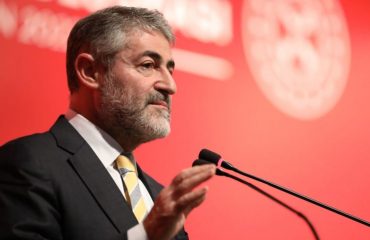

Under the pressure of exchange rates and continuing inflation, the Turkish Central Bank increased the policy rate to 50 percent.
The Turkish Central Bank’s (CBRT) Monetary Policy Committee (PPK) increased the policy rate by 500 base points from 45 percent to 50 percent at its March 21 meeting.
In the statement made by the PPK, which convened under the chairmanship of Central Bank Governor Fatih Karahan, it was stated that it was decided to increase the policy rate, considering the “deterioration in the inflation outlook”. In the statement, the reasons why inflation could not be reduced to the desired levels were listed as the persistent course of domestic demand, the rigidity in services inflation, the continuation of inflation expectations, geopolitical risks, and food prices. This points to the effect of the recent increase in exchange rates and the Central Bank’s sale of 20 billion dollars from reserves in the last month to suppress the exchange rate.
The Committee stated that the “Tight monetary stance will be maintained until a significant and sustained decline in the underlying trend of monthly inflation is observed, and inflation expectations converge to the projected forecast range” and tied the hopes of a decrease in inflation to the second half of 2024.
50 percent behind-the-scenes
Government circles were implying that the policy rate, which was increased from 42.5 percent to 45 percent at the January 2024 meeting of the PPK could remain the same until the autumn months. In this respect, the increase in interest rates to 50 percent was a surprise, but experienced economists began to talk about the need for an increase.
Economist Prof. Dr. In his article in YetkinReport on March 18, Fatih Özatay said that three negative developments in the fight against inflation since February may necessitate an increase in interest rates. Özatay wrote that these three negativities are the failure to properly combat inflation, inflation expectations still being high, and increased exchange rates. The increase in exchange rates was attributed to the questions, especially by foreign investors, about whether President Tayyip Erdoğan would reduce the powers of Treasury and Finance Minister Mehmet Şimşek and give up on the Medium-Term Program (OVP) after the elections.
Prof. from Koç University. Dr. Selva Demiralp wrote on March 20 that an interest rate increase had become inevitable against the “tyrannical” challenge of the markets.
Will the inflation target change?
Prof., one of the former chief economists of the CBRT. Dr. Hakan Kara shared the message “What had to be done has been done, I congratulate you” on his social media account.
Association of Turkish Industrialists, TÜSİAD’s Chief Economist Gizem Öztok Altınsaç also commented on social media, “We are finally talking the truth.”
It is also a matter of curiosity whether the Central Bank will control the increase in exchange rates after this move and reduce inflation to around 36 percent, as a target for the end of the year. Demiralp said earlier to YetkinReport that if the Central Bank does not take additional measures, the year-end inflation could reach or even exceed 50 percent. Will it be enough to increase the policy rate to 50 percent?
Karahan said that only the Central Bank’s use of the policy rate tool may not be enough and that they expect the contribution of the Treasury and Finance, and Şimşek confirmed this. Now all eyes are on the new steps that Şimşek will take after the election.


